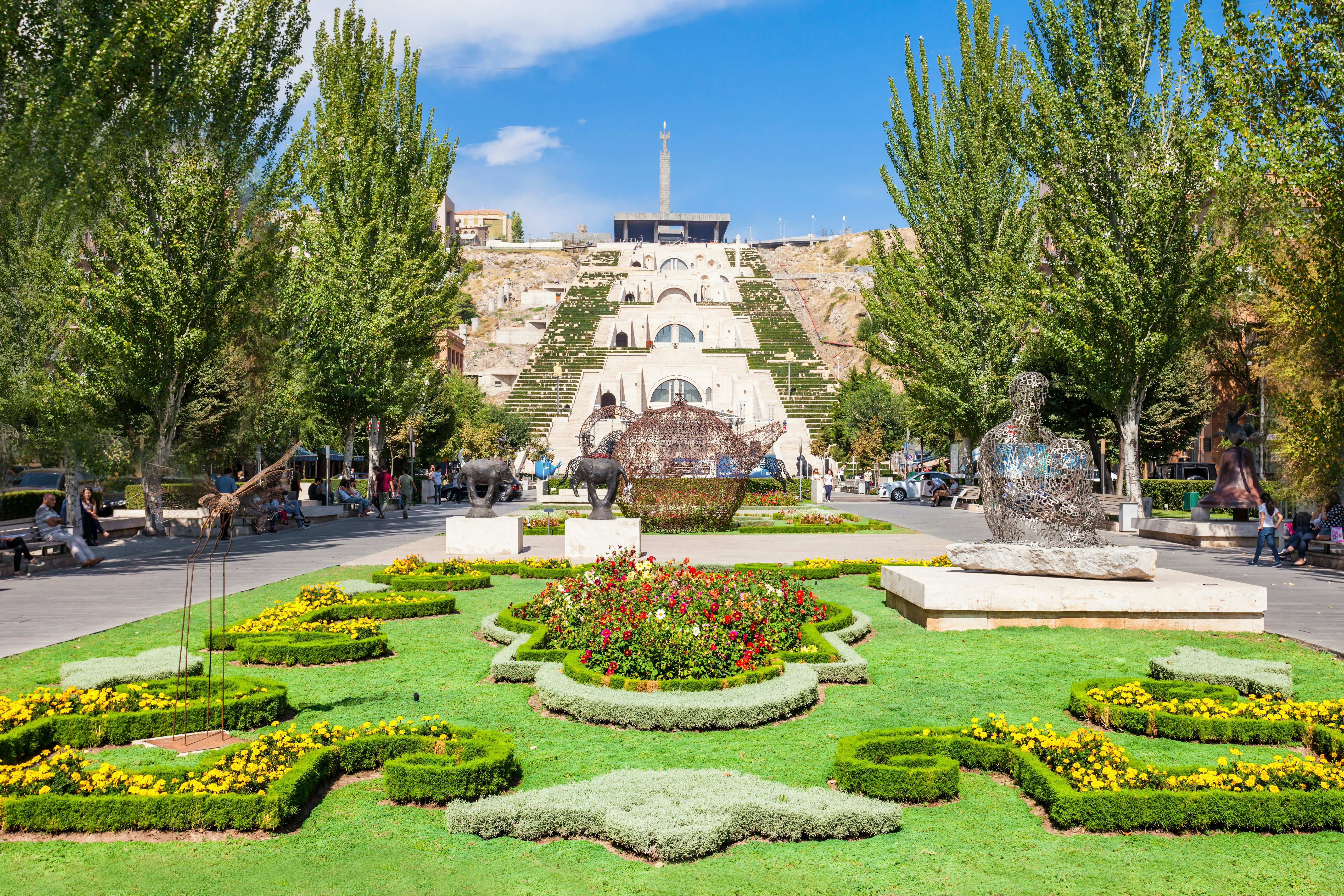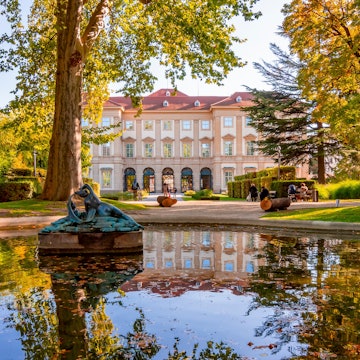

The view from the Alexander Tamanyan–designed Cascade complex. Damian Pankowiec / Shutterstock
Yerevan can be perplexing. Its neoclassical squares conjure Vienna, while its wide boulevards brim with Parisian élan. There’s no escaping the sprawl of brutal high-rises that shoulder its Soviet past, yet recent investment has embalmed the city’s rougher edges with glinting streets, a cable car and arts’ centre, all begging for exploration.
Yerevan is known as the Pink City, the volcanic rock (tuff) iconic of its state buildings forming a fondant panorama around the city’s heart. Meanwhile the verdant hills which cup the 13th capital of Armenia provide a setting which masks its many battle scars.
Shadowed by the fabled Mount Ararat, Armenia has long been a battleground between Muslim and Christian rule, leading to the death of more than a million Armenians. By 1936 it was under Soviet rule, and by 1991, its independence brought with it economic collapse. Yerevan is in a new dawn: bolstered by its foray into technology and help from wealthy expats, the pride, passion and persistence of its people runs through the veins of the city.
A weekend in this manageable and safe city is easy alone or with company, and its big-hearted locals will leave you feeling the great hug of Yerevan long after you’ve left. Here's how to spend 48 hours in this fascinating city.
Day one
Morning
Start out in Republic Square. When architect Alexander Tamanyan’s plans to create the perfect city came to fruition in the 1920s, ancient Yerevan was razed, making way for this jewel of his architectural megalomania. Though not wholly welcomed at the time, this transformation led to a pleasingly compact city centre.
The sweep of pink neoclassical buildings around the square boasts impressively carved arches and stolid colonnades and, by dusk, crowds gather around jubilant fountains that tango to a mix of dreadful pop and more elevated works by Armenia’s leading composer, Khachaturian.
In bygone years, Republic Square was home to a statue of Lenin which, after independence, was unceremoniously wrenched off its pedestal and stuffed into the courtyard of the History Museum of Armenia, where the decapitated torso remains.

Inside, the museum presents the world’s oldest shoe at 5,500 years – completely intact thanks to being sealed in a cave by a surfeit of sheep dung – and you’ll also find preserved wooden burial chariots, Goliath vases, a bronze-age model of the solar system and giant phalluses arranged, with posthumous envy, in size order.
Afternoon
Linking Republic Square to Freedom Square is Northern Ave, home to the rotund Yerevan Opera Theatre. The Tamanyan-designed street didn’t open until 2007, following a cash injection from a wealthy expat. Lined with honey-hued buildings, luxury brands and manicured topiary, it aims to welcome the well-heeled traveller to Yerevan.
It’s along here you’ll find Tsirani, a good spot to feast like a king. Here the dolmas (stuffed vine leaves), grilled meats, herbaceous salads, grilled trout and local buttery cheeses should see you satiated. If not, its onsite bakery brings endless baskets of warm flat breads to enjoy with plenty of velvety Armenian wines.
Late afternoon
If you’re after a shot of soorj (coffee), then the Cascade area has plenty of cafes with kudos. In warmer months it hosts outdoor concerts and, should you fancy a little alfresco dancing, every last Friday of the month, locals help left-footed tourists giggle their way through the traditional Karin folk dance.
The Cascade itself is a giant white stairway with variegated terraces, and links downtown Yerevan with its upper neighbourhood. Inside its belly is the Cafesjian Center for the Arts, housing indoor galleries with works by artists such as Marc Chagall.

Evening
Skip the ubiquitous Irish bars and raucous Russian clubs in favour of the more sedate vibe of Yerevan’s first smoke-free nightclub, Eco Pub on Spendiaryan St. Alternatively, a short walk from the Opera Theatre is The Club, a subterranean restaurant, bar and bookshop with giant cloud-like cushions to melt into.
Day two
Morning
An early morning amble among Yerevan’s parks dotted with cherry and apricot trees should help clear the head before hitting the busy intersection of Mashtots Ave and Sarmen St. Dive into the innocuous looking bookshops and you’ll find intricately carved shelves overlooked by gilded ceilings. A few minutes' walk from here, tucked amidst mid-rise houses and wall murals, is the beautifully tiled façade of the 18th-century Blue Mosque – Armenia’s only active mosque. Its graceful white-washed interior and Islamic garden offer a calming antidote to the bustling city beyond.

Lunch
On Teyran St, you will meet cheap fast food, Armenian style. It's a blessing for the indecisive as there’s only one item on the menu: zhingyalov hats (bread packed with fresh herbs). Wash it down with tan, a yoghurt drink. Also here, with a wonky charm, is Tun Lahmajo, a restaurant dotted with rugs, ancient gramophones and instruments.
Early afternoon
To understand an inescapable part of Armenia’s tumultuous past, take the short taxi ride to the Armenian Genocide Memorial & Museum, sited at the crook of the Hrazdan River. It provides a sobering insight into the mass killing of one million Armenians under the crumbling Ottoman Empire during World War I.

From here, you may want to opt for something more light-hearted. Tasting tours around Yerevan Brandy Company (a drink said to once have tickled the palates of Winston Churchill and Agatha Christie) are offered daily at the distillery overlooking the Hrazdan Gorge.
Late afternoon
Hail a taxi or hop on a marshrutka (minibus) to Arinj village and ask a local for directions to Levon’s house. Resident Tosya told her husband, Levon, to build a potato cellar. Twenty-three years later he had created a subterranean network of divine hallways, shrines and twisting stairways using only hand tools. He died in 2008 and now Tosya runs tours. Those wishing to see any root vegetables will be disappointed.
A final farewell
For a last soiree in the city, a meander in and out of Yerevan's cafes, wine bars and restaurants won’t disappoint.
While the local food is wonderful, Armenia's taste for international cuisine is burgeoning, from Mexican to sushi. The city now also has its first microbrewery. Based on Aram St, Dargett does a mean apricot beer, and makes a good place for a final farewell.
Making it happen
Getting to and from the main Zvartnots International Airport by public transport can be an adventure. The most straightforward way of getting to the heart of Yerevan is by taxi. To avoid being overcharged, preorder with taxoline or ggtaxi or by asking your hotel to arrange one for you – taking one from the airport can cost you three times more. Airlines flying here from Europe include AirFrance, Lufthansa and LOT – all require at least one stopover.






















